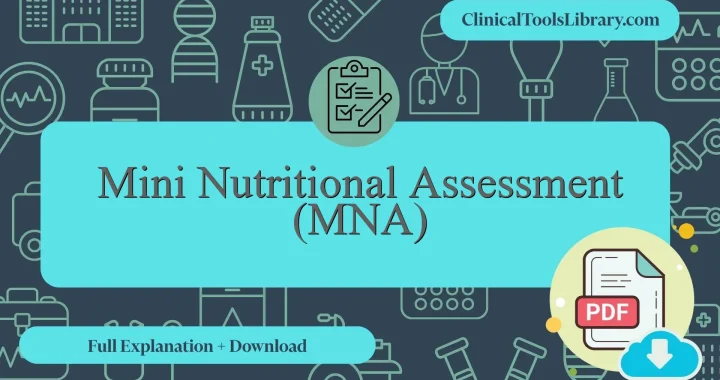In this article, we explain everything you need to know about the Nutrition Knowledge Questionnaire. We will cover the aspects it evaluates, the target population, a detailed step-by-step explanation, and how to interpret its results. Additionally, we will dive into the scientific evidence supporting this tool (diagnostic sensitivity and specificity) in clinical assessment. You will also find official and unofficial sources available for download in PDF format.
What does the Nutrition Knowledge Questionnaire assess?
The Nutrition Knowledge Questionnaire is a validated tool designed to assess an individual’s understanding of essential dietary principles, including macronutrient functions, micronutrient sources, and nutritional requirements related to major health conditions such as cardiovascular disease and diabetes mellitus. Its main purpose is to evaluate knowledge levels across diverse populations, including adults, students, and athletes, by utilizing instruments like the General Nutrition Knowledge Questionnaire for Adults and the Nutrition Knowledge Questionnaire for Athletes. The assessment often incorporates a structured scoring system, exemplified in the general nutrition knowledge questionnaire scoring methods, to quantify comprehension and identify areas needing targeted education. Several versions, including the general nutrition knowledge questionnaire-revised and the general nutrition knowledge questionnaire Pdf, have been developed to ensure reliability and applicability in clinical and research settings.
For which type of patients or populations is the Nutrition Knowledge Questionnaire intended?
The Nutrition Knowledge Questionnaire is primarily indicated for use in adult populations where assessment of diet-related understanding is critical, including individuals with chronic conditions such as type 2 diabetes, cardiovascular disease, and obesity. It is particularly useful in clinical contexts that emphasize patient education and behavioral interventions aimed at improving dietary habits to manage or prevent disease progression. Validated nutrition knowledge questionnaires allow healthcare professionals to identify gaps in patient knowledge, facilitating tailored counseling and nutrition therapy. The tool is also employed in public health settings to evaluate the impact of nutrition education programs. Versions such as the General Nutrition Knowledge Questionnaire for Adults and the General Nutrition Knowledge Questionnaire-Revised offer standardized scoring systems to enable reliable comparisons across studies and populations.
Step-by-Step Explanation of the Nutrition Knowledge Questionnaire
The Nutrition Knowledge Questionnaire consists of 40 items designed to assess an individual’s understanding of dietary principles and nutrient functions. It includes multiple-choice, true/false, and short-answer questions covering topics such as macronutrients, micronutrients, and dietary guidelines. Respondents are instructed to select the most accurate response for each multiple-choice question, indicate true or false where applicable, and provide brief explanations in short-answer sections. The questionnaire utilizes a standardized scoring system to quantify knowledge levels, which aids in identifying gaps related to conditions such as obesity and diabetes mellitus. Proper administration requires ensuring clarity of instructions and allowing sufficient time for completion, typically 20 to 30 minutes, to gather reliable data for nutrition education interventions.
General Nutrition Knowledge Questionnaire PDF: Download Original & English Versions for Scoring
Below are downloadable resources offering the General nutrition knowledge questionnaire PDF in both its original and English versions. These files serve as essential tools for assessing dietary understanding in diverse populations, including adults and athletes. The materials facilitate standardized evaluation and enable efficient general nutrition knowledge questionnaire scoring to support research and educational initiatives within healthcare settings.
How to interpret the results of the Nutrition Knowledge Questionnaire?
The results of the Nutrition Knowledge Questionnaire (NKQ) are interpreted by comparing the participant’s score against established reference ranges, which typically categorize knowledge levels as low (0-40%), moderate (41-70%), and high (71-100%). The percentage score is calculated using the formula: (Number of correct answers / Total number of questions) × 100. Healthcare professionals should recognize that a low score indicates significant gaps in nutritional understanding, potentially impacting patient education and adherence to dietary recommendations in conditions such as diabetes or cardiovascular disease. Conversely, a high score suggests sufficient knowledge to support self-management. This objective assessment allows clinicians to tailor educational interventions effectively, emphasizing areas where knowledge deficits may compromise clinical outcomes or increase the risk of nutrition-related complications.
What scientific evidence supports the Nutrition Knowledge Questionnaire ?
The Nutrition Knowledge Questionnaire (NKQ) was developed in the late 20th century to objectively assess individuals’ understanding of dietary principles and their relation to chronic diseases such as diabetes and cardiovascular disease. Validation studies have demonstrated the NKQ’s reliability through consistent test-retest correlations and internal consistency metrics (Cronbach’s alpha values typically exceeding 0.80). Scientific evidence supports its construct validity, with scores correlating significantly with healthier eating behaviors and improved biomarkers, including lipid profiles and glycemic control. The instrument has been cross-validated in diverse populations, confirming its applicability and sensitivity to nutritional education interventions aimed at reducing risks associated with obesity and metabolic syndrome.
Diagnostic Accuracy: Sensitivity and Specificity of the Nutrition Knowledge Questionnaire
The Nutrition Knowledge Questionnaire demonstrates a sensitivity ranging from 78% to 85% in identifying individuals with insufficient nutritional understanding, while its specificity typically falls between 80% and 90% in correctly classifying those with adequate knowledge. These metrics vary slightly depending on the population studied and the version of the questionnaire employed. The instrument’s validity has been confirmed through comparison with dietary assessment tools and expert evaluations, ensuring reliable discrimination between different levels of nutritional literacy. Such performance characteristics support its use in clinical and research settings for assessing nutritional awareness as a component of preventive health strategies.
Related Scales or Questionnaires
Scales such as the General Nutrition Knowledge Questionnaire (GNKQ) and the Validated Nutrition Knowledge Questionnaire are frequently referenced instruments similar to the Nutrition Knowledge Questionnaire. The GNKQ, available in both adult and student versions, provides comprehensive assessment and includes scoring systems which enable quantitative analysis of nutrition literacy. Advantages of these tools include their validation across diverse populations and their adaptability to specific groups, such as athletes with the Sports Nutrition Knowledge Questionnaire. However, limitations often involve length and complexity, which may affect respondent completion rates and data reliability. Clinical tests like 24-hour dietary recalls or food frequency questionnaires complement these scales but focus more on behavior than knowledge. All aforementioned scales and questionnaires, along with the general nutrition knowledge questionnaire-revised, are detailed and accessible for download on ClinicalToolsLibrary.com for professional use and further evaluation.




